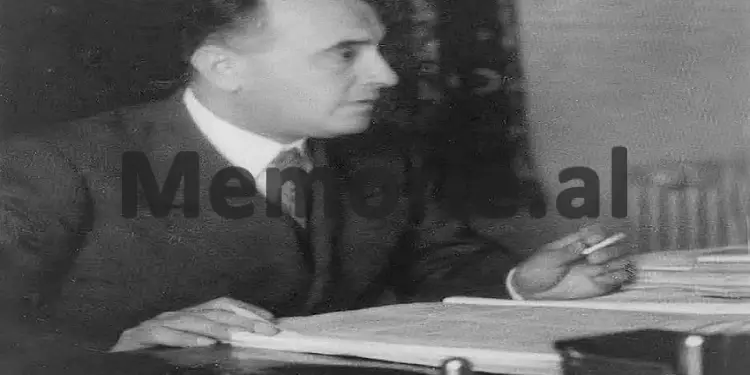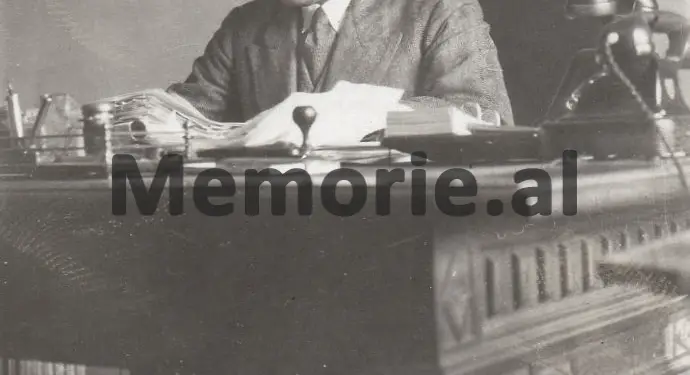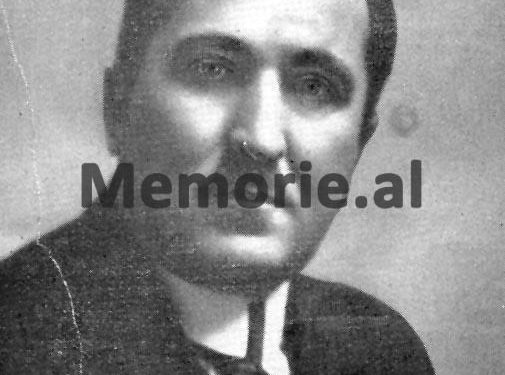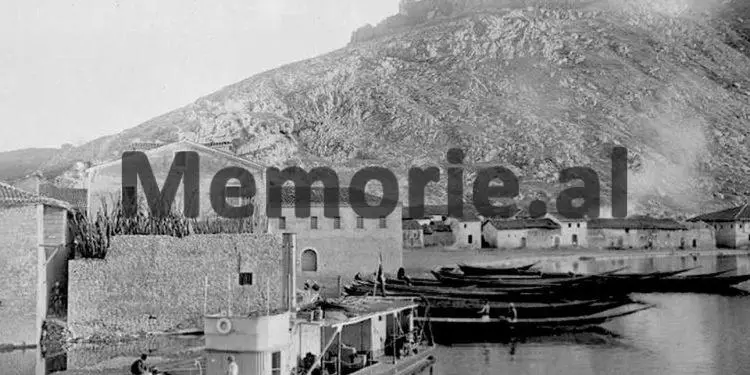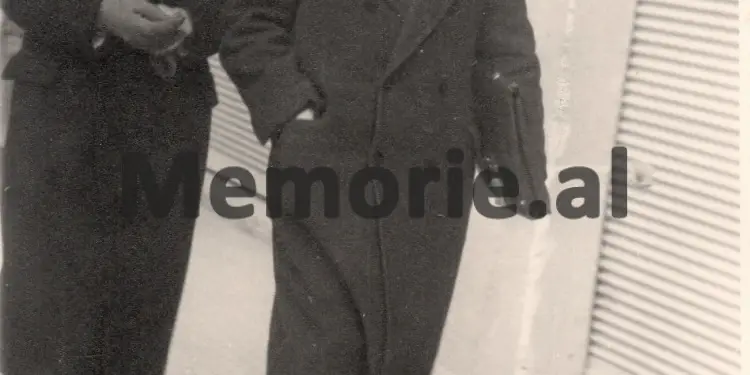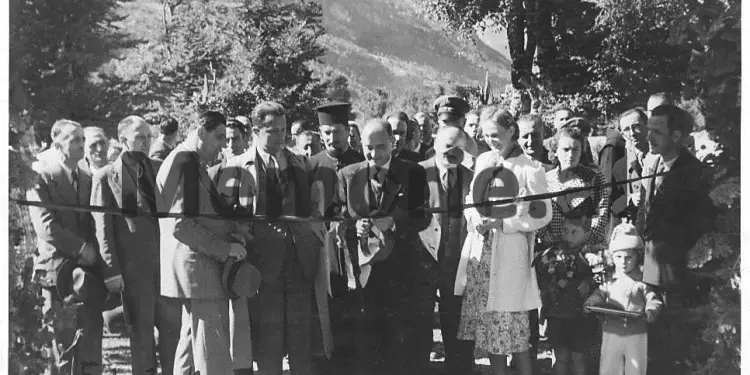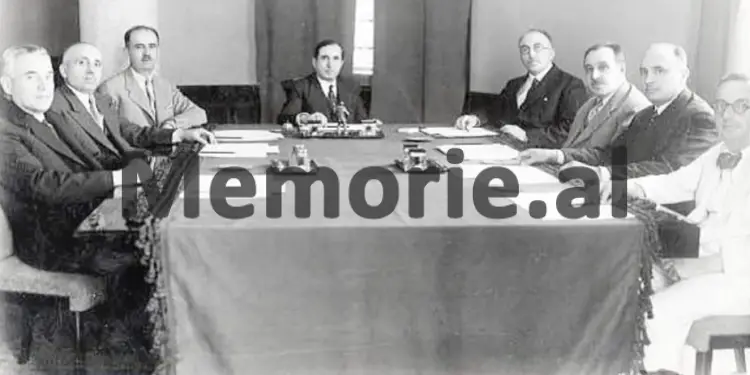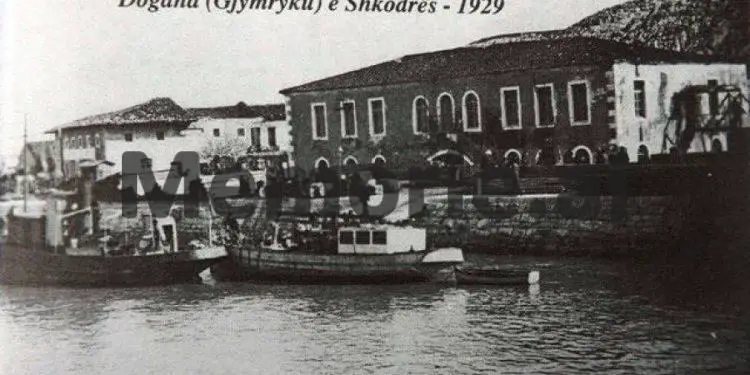By Arben Pustina
The tenth part
-Rrok Gera, a proper statesman –
FORWARD
Memorie.al / This book aims to convey to the public the image of a perfect man, who lived in other times, but who was the best example, not only of what an ordinary man can represent, but, next first, as an example of a noble, distinguished, omniscient and, above all, honest statesman. Having in his genes the noble virtues of his origin, being formed as a personality in a wonderful environment, such as Shkodra at the beginning of the 20th century, and graduating from one of the most prestigious universities in Europe, such as that of In Vienna, Rrok Gera had all the potential to be one of the important figures who gave rise to a rapid development through comprehensive reforms in Albania in the 30s of the last century.
This development reached its peak with the government of Mehdi Frashër, considered perhaps the best Albanian government of all time, formed for the most part by non-political persons, among who was Rrok Gera. For 10 years, or more, as a minister or in other high state functions, he worked with conviction that he was walking on the right path for the consolidation of the Albanian state, a process for which he said he had no time to lose. Economist, financier, diplomat, lawyer, Gera was a specialist who advanced towards the top with his professionalism in an environment where the old factions, which were almost dominant in politics and governance, lost ground in front of young and educated people good.
MINISTER OF NATIONAL ECONOMY IN THE GOVERNMENT OF KOÇO KOTA
The Ministry of National Economy at that time included the main sectors of the economy and beyond. The change in the government cabinet of Albania was also reflected in the foreign press. Thus, the French newspaper “Journal des Debates”, dated June 2, 1938, also wrote about the event in question. As it claimed, this Ministry had under its direction: Agriculture, Agrarian Reform, Forests and Pastures, Water Regulation and Reclamation in general, Veterinary and Zootechnics, Mining, Trade, Industry and Crafts, supervision of the State Bank as well as management of the Port of Durrës. As he had previously worked at the head of state finances, Rrok Gera applied himself to his new task with the usual zeal, but the focus of his work, as expected, would be especially the activity of Italian companies, which had received, or expected to receive, the relevant concessions.
The Italian company PESCALBA, which had the fishing concession in Albania, committed continuous violations that conflicted with the said concession agreement. This company, without the knowledge of the Albanian State Border and Customs bodies, exported to Italy large quantities of fish, caught in Albanian waters, and in the meantime did not put on the market the quantities of fish promised for consumption by the Albanian population. Especially from the fishermen of Shiroka and Dajlan of Buna, there were many complaints against the company for difficult working conditions, for low payments, for wage differentials with Italian workers, and even for sabotage in their work.
Reacting to one of the violations committed by the Italian company, in June 1938, Rrok Gera, who had just assumed the position of Minister of National Economy, sent a letter to the Directorate of Water in Tirana, with which he requested that this directorate urgently sent its specialists to Shkodër to see the work being carried out by PESCALBA and to warn its representatives that they could not start any work on the construction of the Buna dam without the knowledge of the Albanian authorities.
But PESCALBA’s activity would continue to be the focus of the work of the Minister of National Economy. Thus, on 11.09.1938, this Ministry had received, according to its order, a detailed report from a fishing specialist, regarding the activity of PESCALBA. Even later, the Albanian government looked at the possibility of removing this concession, which is quite problematic. Since the end of 1937 and following 1938, a large amount of skins originating from Albania remained unsold in the warehouses of the ports of Naples and Trieste, bringing great losses to Albanian traders.
This happened because the Italian firms that had received the permits to carry out their sales had not fully utilized them. The issue continued to be problematic even in the summer of 1938. A few days after assuming the office of Minister of National Economy, on June 14, Rrok Gera sent a letter to the Council of Ministers and the Ministry of Foreign Affairs of Albania, complaining about the great delays that were proven in the granting of permits for the purchase of the main agricultural and livestock products from Italian firms.
The letter stated that the permits for the first semester of 1938 had been distributed at the end of it, that is, very late. In this same letter, Gera claimed meanwhile that the Albanian traders were right in their claim that, for the import of skins from Albania, the Italian government had given permission only to the Italian company E.I.A.A. (Ente Industria Agraria Albania). In another letter, dated June 20, 1938, the Minister of National Economy asked the MFA of Albania to intervene with the Italian authorities, to request the sending as soon as possible of the list of Italian firms that were charged with purchasing the products agricultural and livestock from Albania.
In Gera’s letter, it was emphasized that this would serve to avoid the unpopularity of these lists being distributed with numerous delays. But, despite the insistence of the head of the Ministry of National Economy, the problem was not being solved. By means of the reserved letter dated July 18, 1938, Gera informed the Presidency of the Council of Ministers in detail about the progress of the problem in question as well as the problems for trade with Italy in general.
In his letter, he initially claimed that among the reserve acts of the Ministry of National Economy, he had found the confidential letter No. 544, dated February 21, 1938, which the Minister of Italy in Tirana had addressed to the head of the Ministry of Economy at the time and, according to the content of the letter, it appeared that the Minister of Italy had announced that from January 1, 1938, of course revoked the concession of premiums that had been stabilized within the limits of the six-month quotas for some products of Albanian origin that were exported to Italy.
In the letter sent to the Council of Ministers, Rrok Gera noted that it was necessary to see if his predecessor in the Ministry had the mandate to accept on behalf of the Albanian government the revocation of the document of January 28, 1936, which was related to these concessions, and it was necessary to study what important motives had pushed the Italian minister in Tirana to declare the revocation of the concessions in question.
After stating that he would send a separate letter on the issue of E.I.A.A., Gera noted that this first letter of his was not just for information, but a request for the urgent study of the problem: …”we get permission adding that we are not raising this issue just for the sake of chronicle, but in order for the Honorable Ministerial Council to determine the course of action, perhaps it is not possible and logical, at a time when Albanian relations with Italy are so cordial, the purpose of that letter was to protect Albanian interests…”. On the same day, July 18, 1938, Gera sent a second letter to the Council of Ministers, where, as he had announced in the previous letter, he clarified the problem created with the E.I.A.A. society.
He emphasized that the main reason that the Albanian government had entered into an agreement with E.I.A.A. was that the Italian government (on the basis of bilateral agreements) would make available to Albanian producers and exporters a part of the permits reserved for Italian citizens for the import of goods in Italy, but not being able to grant these permits directly to handed over to Albanian producers and exporters, the permits were made available to the Albanian government through the company E.I.A.A.
According to the agreement with E.I.A.A., the Italian government made available to the Albanian government 30% of the permits through this company, which would use these permits to buy Albanian products at certain prices in agreement with the Ministry of National Economy, to favor the importation of Albanian products to Italy through the allocation of special premiums as well as to enable the Albanian producers themselves to sell in Italy without formalities of permits.
Albanian exporters were also given the opportunity to find the Italian importer themselves, by making the agreement with him, using the E.I.A.A. only as a commissioner, and Albanians were given the opportunity to export and sell goods in Italy, using E.I.A.A. only for customs formalities. But due to the Italian system of imports, things did not work as they were predicted and the agreement was not bringing the promised advantages to the Albanian side, so the former Minister of National Economy (predecessor of Rrok Gera), there was a reaction on October 28, 1937, where by means of a letter denouncing the convention with E.I.A.A.
However, in the lists of the first semester of 1938, among the Italian firms that had permission to import Albanian goods, the company E.I.A.A. continued to be at the top, which also bought the permits of other merchants, when they did not cartelize with it. The Italian company thus continued to maintain the monopoly of exports of Albanian agricultural and livestock products, dictating the reduction of prices for these goods and realizing large profits for the benefit of the Italian state, which was also the owner of the majority of E.I.A.A.’s shares.
Therefore, Minister Gera came to the conclusion that the denunciation of the convention with E.I.A.A. had practically only caused the cancellation of Albanian interests and not the cancellation of E.I.A.A.’s mediation. Without wanting to blame anyone for malicious intentions, Rrok Gera noted in his letter to the Council of Ministers, that the action denouncing the convention with E.I.A.A., was completely irregular and incompatible with the preservation of the state’s interests.
Based on the talks held yesterday in the Ministerial Council, please make a decision to authorize our Representative in Rome to conclude an addendum to our commercial agreement with Italy, with the following conditions: 1). That our imports into Italy as well as the exit of foreign currency to Albania should be left completely free, which means that they should not be subject to import and exit permits for foreign currency. Regarding foreign exchange, if it is not possible to leave them completely free, at least to ensure the permission to leave within 15 days from the version of the counterclaim of the goods in one of the banks there from the importing company. 2).
In the event that this will not be acceptable, then it is requested from them, that the allocation of permits to Italian firms for the quotas of Albanian goods, be made on the basis of a list, to be presented by the Albanian Government one month before the beginning of each semester they mean that the Italian Government will give the permits to the importing firms of its country, which will be designated by the Albanian Government.
This list will be presented to the Italian Government through our Legation in Rome and the Italian Government will distribute the permits according to the list presented within the first 15 days of the first month of the semester to which the contingent belongs. These permits must be non-transferable and for permits not used in whole or in part in a semester, another Italian importing company may be assigned by the Albanian Government. Even in this case, foreign currency withdrawal permits for imports from Albania must be granted by the relevant Institute within 15 days from the date of deposit of the counterclaim of the goods imported by the Italian firm in one of the Italian banks, which must complete the appropriate formalities within one week from the date of deposit. Minister of National Economy: Rrok Gera.
About a week later, at its meeting on December 31, 1938, the Presidency of the Council of Ministers took the decision authorizing the Albanian Legation in Rome to sign the amendments to the commercial agreement between Albania and Italy. In order to reach the agreement, the decision of the Council of Ministers determined word for word the conditions that the Minister of National Economy, Gera, had submitted in his letter of December 23, 1938. But even after taking this decision, the road to resolving the deadlock in trade with Italy, it was long and with obstacles.
The passive trade balances with Albania during the last years had enraged the Italians, so it seems that during 1938 and following, they were making all possible efforts to hinder our exports and weaken our economy. For this reason, even in the first months of 1939, Rrok Gera had a frequent communication with the Ministry of Foreign Affairs and with our representatives in the Rome Legation. At the beginning of 1939, the Ministry of National Economy considered it necessary to issue import permits for Albanian goods in Italy as soon as possible, in order not to create a vacuum until the new trade agreement with Italy is reached, based on the decision of the Council of Ministers, December 31, 1938.
For this purpose, Minister Gera had sent the letter 490/125 to our Legation in Rome, 8 days before the decision was made on December 31, (that is, on December 23), asking him not to waste time and that the Legation provide permits for the semester first of 1939, according to the agreement that was in force. As for the permits for the second semester for 1939, it was believed that they would be granted on the basis of the new agreement, which would be reached by that time.
In his letter of February 11, 1939, with no. 533/4, addressed to our Legate in Rome, Rrok Gera again emphasized the necessity of issuing Albanian export permits to Italy as quickly as possible, especially for some goods, which could not stay long in the warehouse (such as olives), or they risked that their price would decrease too much (such as wool, which appeared on the market in April with new quantities). According to Gera, the suspension of the agreement in force, without concluding the new agreement, would cause great damage, not only to the traders, but also to the producers, so he underlined that it was up to the Legata to try to issue export permits for the first semester of the following year (1939) as soon as possible.
Gera also requested from the Legate, careful information about whatever was happening in Italy, as far as the trade with Albania was concerned: “I would beg that Legate to have the kindness to inform me of any developments regarding the agreement of re as well as any other actions of the authorities there regarding our imports there. In these last days, we found out that the Government there is organizing consortia of importers of our goods in order to discipline the prices of goods to be imported from Albania, meaning to stop free competition even if an agreement is accepted as she requested with the above-mentioned decision of P.T. Ministerial Council. Since this issue is very important, please take care of the accuracy of this information and have the kindness to notify us once.” Memorie.al




